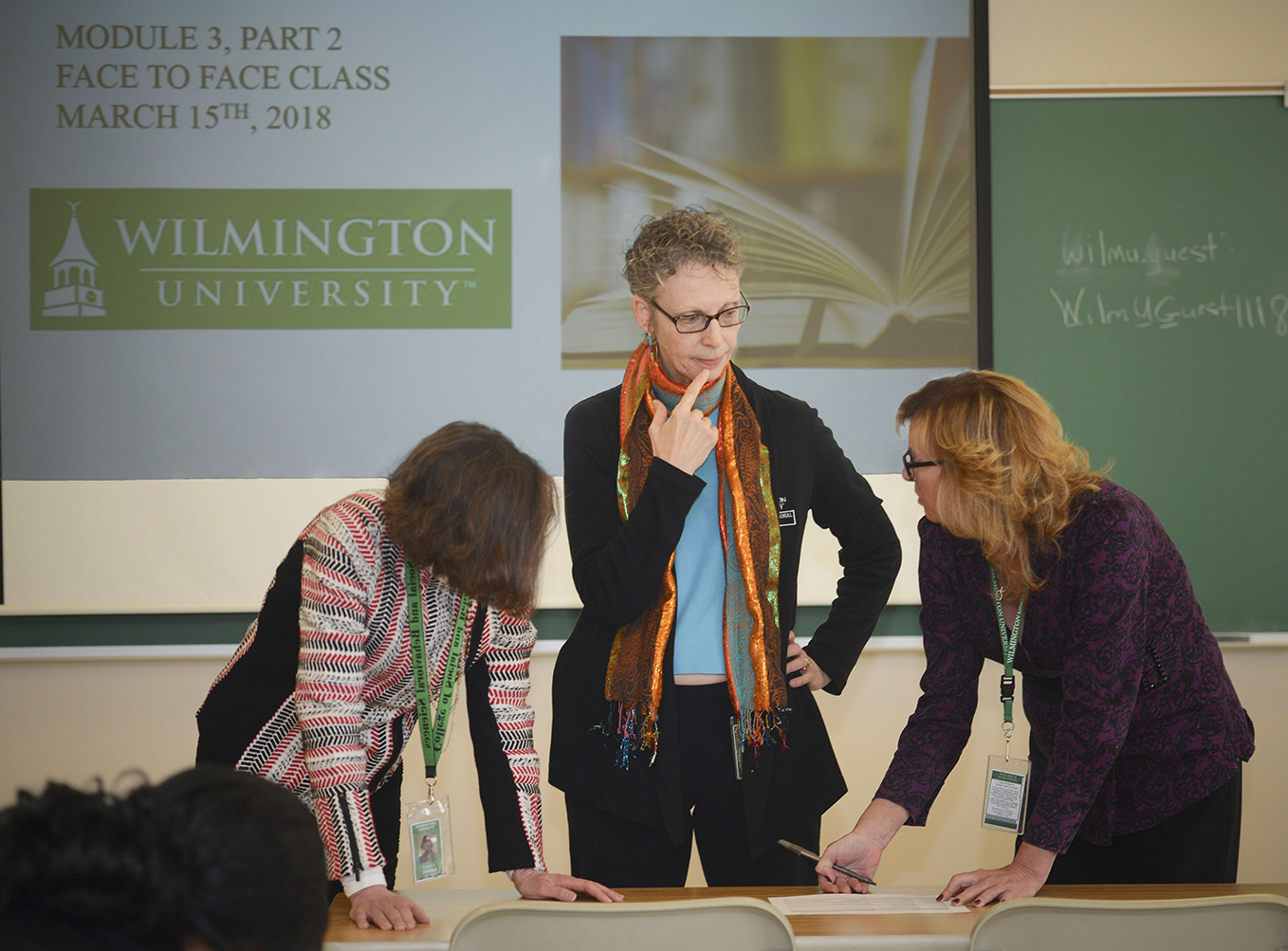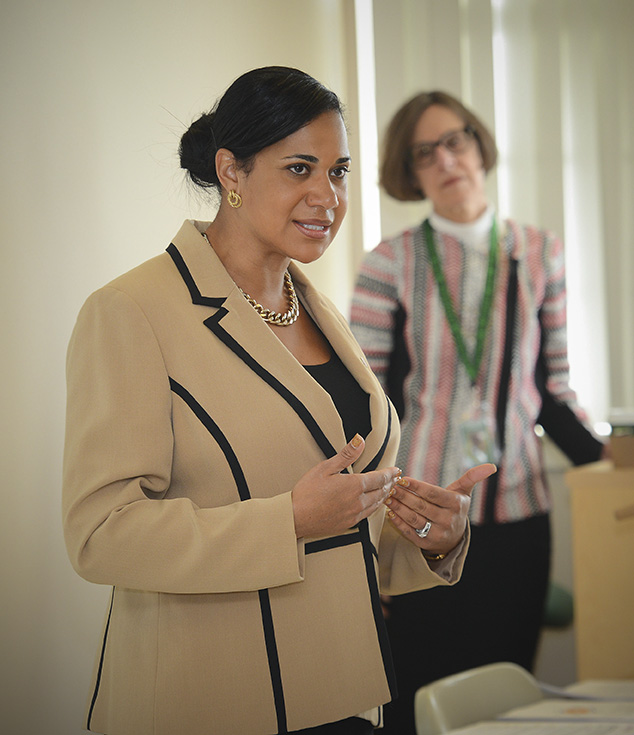What’s causing some lifespans to be shortened by up to 20 years? An insidious virus? A drug-resistant strain of bacteria? Would you be surprised to learn that the cause is toxic stress?

Marilyn Siebold, Dr. Debra Berke and Kim Newell discuss how best to “train” trainers for the Trauma-Informed Approach Initiative. (Photo by Susan Gregg)
We all experience stress in our daily lives. Some stress, like work or school deadlines, can help us develop and make us productive. But toxic stress is robust, frequent or prolonged. Exposure to this type of stress through adverse childhood experiences like suffering abuse, living in a home with a caretaker who experiences domestic violence, mental illness and addiction issues, or living in a violent neighborhood can increase the risk of stress-related physical and mental illness in adulthood.
Wilmington University is partnering with the Delaware Department of Health and Social Services (DHSS) on a unique workforce development project to explore the issue. The yearlong Trauma-Informed Approach Initiative will educate DHSS staff about the impact of cumulative stress and traumatic experiences in their clients’ lives so they can better assess and address client needs. The training will also help DHSS staff recognize and prevent trauma fatigue, the emotional toll experienced by those in the helping professions. Twenty-six supervisors and trainers from three units within DHSS — Division of State Service Centers, Division of Social Services, and Division of Child Support Services — engaged in a nine-week training course from January through March. The 54-hour blended learning training presented half of the material in a face-to-face format at the New Castle campus and half online using WilmU’s learning management system. Dr. Debra Berke, associate professor and director of Psychology programs, and Marilyn Siebold, an adjunct professor in the Psychology program, led the training.
Dr. Berke explains the trauma-informed approach as one that takes a holistic view, asking, “What happened to this person?” instead of the traditional approach of, “What’s wrong with this person?” Siebold describes the core values of a trauma-informed system as those that provide clients safety, trustworthiness, choice, collaboration and empowerment. “Understanding the prevalence and impact of trauma is the first step for building capacity,” she tells the DHSS staff. “You have the ability to provide clients with knowledge, tools and skills to help them unleash their power and use their strengths to make choices for their lives.”
Intern Kristen Flynn, an undergraduate Psychology major who helped identify resources for the training and helped design assessments of participants‘ learning, assisted the leaders. “It was a remarkable experience to see training participants understand, conceptualize and use the trauma-informed lens in a real-world application,” she says. (Flynn completed the Trauma-Informed Approaches Certificate as part of her undergraduate studies.)
Trauma-informed approaches are based on the findings of the Adverse Childhood Experiences (ACES) study conducted by the Kaiser Permanente health system and the Centers for Disease Control. One of the most extensive investigations of childhood maltreatment and lifelong health and well-being, the study sampled 17,500 study subjects with private health insurance and utilized childhood exposures to abuse and household dysfunction — like substance abuse or domestic violence — for its analysis. Adverse childhood experiences were strong-ly related to one another and researchers concluded that persons with childhood exposure to these experiences were likely to have multiple health risk factors later in life that resulted in shortened lifespans due to causes like heart disease and cancer. The magnitude of the reported ACES scores was staggering: Adults who had experienced four or more categories of childhood exposure compared to those who had experienced none had significantly high and increased risks for alcoholism, drug abuse, depression and suicide attempts. There were also significant increases in smoking and morbid obesity.

DHSS Secretary Dr. Kara Odom Walker
DHSS Secretary Dr. Kara Odom Walker, a Delaware native and board-certified family physician, spoke to her staff at one of the training sessions about the social challenges and effects of trauma on our communities. Her history of working with underserved neighborhoods gives her a perspective on the multiple challenges facing patients, families and neighborhoods.
“We have to talk about trauma,” says Dr. Odom Walker. “Based on our clients’ zip codes, we know the health challenges they face. From evidence-based research, we understand the tie between trauma — including exposure to adverse childhood experiences — and health outcomes.”
As a family medicine practitioner, Dr. Odom Walker learned the importance of getting to know people as well as their life experiences. Positive, supportive relationships have been identified as the primary path to assisting those affected by trauma. “We need to give young people the promise of the future,” she told training class attendees. “Through our one-on-one interactions with people, we can build trusting relationships.”
“Now is the right time to transform our culture,” says RN Renee Beaman, director of the Division of State Services Centers who completed the nine-week training session with her DHSS colleagues. She says the training will be a long-term initiative that will be offered to additional divisions of DHSS in the coming years. “The role of trauma has been ignored or misunderstood in the lives of people who are most in need of understanding,” Beaman says. “By better understanding our clients and their experiences, we can provide better services.”
Based on a “train the trainer” model, the initial training course utilizes content from Wilmington University’s popular Trauma-Informed Approaches undergraduate certificate. The DHSS staff that attended this first phase helped develop a 12.5-hour training module they plan to roll out this year to about 1,000 employees across its three divisions. Beaman appreciates the partnership with WilmU because the faculty recognizes the importance this issue is for the community. “They created training that is specialized for our needs,” she says.
“This partnership with DHSS is one example of how Wilmington University is investing in the lives of Delawareans,” says Dr. Berke. “We are enhancing organizational capacity and resources with the ultimate goals of promoting health and well-being and preventing adverse outcomes for individuals, families, communities and society.” WU
To learn more about the Trauma-Informed Approaches Certificate, visit http://www.wilmu.edu/behavioralscience/trauma-informed-certificate.aspx
– Lori Sitler

